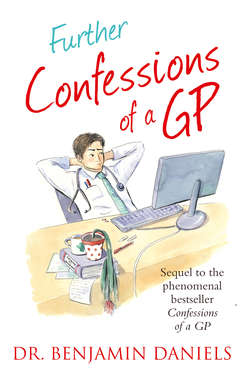Читать книгу Further Confessions of a GP - Benjamin Daniels - Страница 22
Pseudoseizures
ОглавлениеA pseudoseizure is a pretend fit. The person flails their arms and groans a bit as if having a real epileptic seizure, but in fact they are completely conscious and are in full control of their actions. This may seem to you as a very odd thing to do, but surprisingly they are really quite common. In fact, when I qualified as a doctor I witnessed three pseudoseizures before I saw a genuine epileptic fit. As I have become more experienced, it becomes easier to differentiate between a pseudoseizure and a real one.
Barry, the nurse I work with in A&E, is particularly unsympathetic to the condition. When he sees one of our regulars coming in pretending to be fitting, he rubs his knuckles hard on the patient’s chest. If the patient sits bolt upright and tells him to ‘fuck off’, we can all be reassured of the true diagnosis. Personally I prefer a slightly subtler approach. By gently stroking the eyelash, someone conscious won’t be able to help but flicker their lower lid. It avoids unnecessary swearing or potentially bruising the chest wall of some poor bugger who is genuinely having a seizure.
As an A&E doctor, I viewed pseudoseizures as yet another odd preserve of the crazies who dog the department, but as a GP I have been given the opportunity to gain some insight as to why people have them.
Carrie has them frequently, and recently she had one in my surgery waiting room. Picture the scene: Carrie comes to the desk wanting to see me on a busy Monday afternoon. The receptionist tells her that there are no appointments until the following day. Carrie then falls to the floor dramatically and shakes all her limbs. Everyone in the busy waiting room clambers over to help her and I get an emergency call interrupting both myself and the patient I am seeing. As I rush into the waiting room, I think I can see just the faintest of self-satisfied smiles on Carrie’s face. She has got the attention she was craving. If the waiting room had been empty, I could have told Carrie to get up and stop making such a scene. This of course looks a tad on the unsympathetic side to her worried audience who are expecting me to offer suitable emergency treatment for what they believe to be a poorly epileptic.
I compromise and help Carrie into my room, apologetically upending the poor patient I had been seeing and delaying the remainder of my afternoon surgery. Carrie gets my attention and the appointment she wanted at rapid speed.
Her pseudoseizures also commonly occur when her boyfriend splits up with her or when she has had a big row with her mum. In these situations, the pseudoseizures are a brief and effective distraction from the current unpleasant realities of her life. They also result in her receiving the sort of sympathy and attention that she normally struggles to elicit. Carrie offers plenty for a psychotherapist to get stuck into, but for a lowly GP like me it is just a matter of trying to manage the situation as best as possible in the 10 minutes I have. I do feel sympathetic towards Carrie and hope the psychotherapist I referred her to helps her to manage her symptoms. Having said that, I can’t say there aren’t moments when I wish I had Barry at hand to offer a couple of hard knuckle rubs on her sternum the next time she dramatically collapses in my busy waiting room.
